In a History of Freemasonry, by Augustus C. L. Arnold, LL.D., and the Rev. Wm. P. Strickland, D.D., now appearing in the columns of the New York Square, there are one or two statements in the section of Chapter I., published on the 19th ult., which appear to us to be well worthy of notice.
We agree with the learned doctors as to the unwisdom of turning to a very remote past for the origin of Speculative Freemasonry—in the sense, at least, in which so many of our Masonic historians have done.
It is quite enough for us to know that the principles of our Society have been in force from the very earliest times. To make this a ground for establishing a connected history of our Body, through all ages, with all the paraphernalia of persons, times, and circumstances, to impress into such history the names of the wise and learned of all ages and countries as having belonged to our Craft—the only result of this has been to make us the laughing-stock of the world.
Fully recognising, however, as we do, on the part of our readers, the indecency of such a course we are still not quite prepared to accept the theory that Modern, or Speculative Freemasonry dates no further back than the early part of the eighteenth century.
The more intently we study, the more painfully aware do we become of the difficulties to be surmounted, in order to arrive at a just appreciation of the origin of Masonry as a science.
Yet we think we see our way to a theory of no little value, which many, we believe, hold in common with ourselves, that Speculative Freemasonry gradually, and indeed almost imperceptibly engrafted itself on Operative Masonry.
We think we are justified in affirming that while the Society of Free and Accepted Masons was organised at the so-called Revival in1717, there are evidences that for nearly, if not quite a century before, the mere art or craft of Masonry was slowly, but surely, expanding into a science.
We pass by the question whether or not the New Atlantis of Bacon must be taken as foreshadowing the rise of a new philosophy, since known as Speculative Freemasonry.
We have it on the authority of early Scottish records, as quoted in Bro. Murray Lyon’s valuable work on Freemasonry in Scotland, that in Scotland, in the course of the seventeenth century, many persons of quality became members of the Fraternity of Masons, and were known subsequently by such appellations as ” Gentlemen Masons,” ” Theorical Masons,” “Geomatic Masons,” “Architect Masons,” “Honorary Members,” the Operative Members being known as ” Domatic Masons.”
The earliest of the minutes recording the introduction into the Lodge of Edinburgh of such personages is worth transcribing from our learned Brother’s interesting narrative.
They read as follow:—
The 3 day off Joulay 1631. The quhilk day the Eight honirabell my LORD ALEXANDER is admitet folowe off the craft be Hewe Forest diken, and Alexander Nesbet warden ; and the hell rest off the mestercs off masones off Edenbroch; and therto euerie mester heath supscriuet with ther handea or set to ther markes, [Deacon and Warden’s marks], Jn. Watt, Thomas Patorsone, Alexander, JohnMylln.
The 3 clay of Jonlio 1634 The quhilk day ANTONIE ALEXANDER, Right honirabell Mester of Work to his Majestic be admisione off Hewe Forest deken, and Alexander Nesbet warden, and the hell rest off the Mesteros off mesoties of Edenbroch : and therto enerio mester heath supscrinet with ther handes or eles pet to ther markes. Thomas Ainslie, Thomas Patersone, Robert Gray [Deacon and Warden’s marks], Jn. Watt, Alexander, An. Alexander, Johno Myllo.
At Edinburgh, the 3rd of July 1634. Thoe qahilk day St ALEXANDRE STRACUAN of Thorntown is admitted fellow craft be Hew Forrest deaken, and Alexr. Nisbet warden, and the haile rest of the Mester measons of Edinburghe and in token there off the mesters underscryband have sett to their hands and marks to their prsnts. [Deacon and Warden’s marks] Jno. Watt, Robort Gray, Thomas Ainslie, Thomas Paterson, Johne Mylln, Alexander, An. Alexander A. Strachan.
Other similar minutes are given, among them one recording the admission, on the 20th May 1640, of ” the right honerabell ALEXANDER HAMILTONE, general of the artilleries of the kingdom,” and another of the admission, on the 27th July 1647, of ” WILLIAM MAXWELL, doctor off Fisek ordinare to hes Maj’stie hines.”
The well-known case in England of the admission at Warrington of Elias Ashsole and Colonel Manwaring, in 1646, and the mention by the former of his presence in a Lodge at Masons’ Hall, London on 11th March 1682, when Sir William Wilson, Knt., Captain Richard Borthwick, and others were admitted into the Fellowship of Freemasons, need only to be mentioned here.
We shall have occasion to say later a few words on this case of non-operative Masonry. Neither is there reason for our doing more than refer to the statement of Dr. Plot, who says, in his Natural History of Staffordshire, as quoted by Findel at p. 117 of his history :
” I met with persons of the highest rank, who thought it no scorn to belong to this society.”
Taking these together we consider we are justified in accepting them as fair evidence that, for nearly a century anterior to 1717, the old art or Craft Masonry was gradually losing a portion of its distinctive character by the admission into its fold of persons of rank.
It is, of course, impossible to determine the reasons which influenced these persons to seek admission into this Guild.
We do not, however, consider we are going very wide of the mark, bearing in mind the influence of Bacon, not only on the age in which he lived, but likewise on the generations that immediately followed, if we include amongst them a desire to penetrate the hidden mysteries of an ancient and honourable society, in the hope that the acquisition of such knowledge might tend to promote the interests of science generally.
We do not believe they had any settled conviction that such a result would follow. They were curious as well as eager in their pursuit after knowledge.
Some, no doubt, were influenced to jo in by mere idle motives, some by a simple wish to bring the different classes of society into closer conjunction. But having made due allowance for these two categories of honorary Masons, we think it highly probable that others were impelled to join by their enthusiastic love of science.
We have said, in former articles, that we do not believe Speculative Freemasonry sprang into being all of a sudden, at the bidding of Desaguliers, Payne, Anderson, and a few others, learned though these undoubtedly were.
It is hardly in reason to suppose that a new philosophy should acquire universal fame at, as it were, a moment’s notice.
It appears to us there must have been a gradual preparation of men’s minds for its reception, and, in our opinion, the fact of there having been so many instances of ” theorical Masons ” admitted into operative Lodges, in Scotland and in England, during more than eighty years previous to the Revival, is so much evidence in favour of our theory.
We may smile at the notion that Speculative Freemasonry has existed through all time, but we do not think it sprang into being suddenly in 1717.We have said we should refer later to the case of Ashmole.
We are impelled to do so by reason of a statement in the article in The New York Square already mentioned. We take exception to the following passage:
” Hence, Elias Ashmole never was made a Free Mason, and instead of ‘ his diary showing incontestibly the existence of Free-masons in 1646,’ it proves directly the contrary, unless it can be shown that operative and speculative Masonry are one and the same thing.”
We see no reason to doubt the accuracy of the excerpt from Ashmole’s diary—we do not quote it, for it is so generally known, but our readers will find it in a footnote at pp . 139- 140 of Oliver’s edition of Preston’s Illustrations—or why the explanation ordinarily attached to it should be called in question. When Ashmole states that he was ” made a Freemason ” on 16th October 1646, and again that he was present, March 11, 1682, when certain gentlemen ” were admitted into the Fellowship of Freemasons,” we do not understand him to use the word Freemasons in its speculative sense. We consider he means that he was made free of the guild of Masons, just as, even now, we speak of men being made free of the City of London or of Edinburgh.
The value of Ashmole’s statement lies in the proof it furnishes that in the middle of the seventeenth century there were non-operative members of the guild of Masonry. The still earlier records we have quoted from Murray Lyon’s history show this was also the case in Scotland.
Here is evidence that cannot be doubted, nor need we, in accepting it, go the length of considering “operative and speculative Masonry are one and the same thing.”
Gradually, the non-operative element in Masonry, by reason of its increasing numbers, became more powerful than the operative, until, at length, in the beginning of the eighteenth century, Masons’ Lodges became wholly speculative.
It may be from our inability to appreciate the merits of the argument as stated in the last two paragraphs in the article of our contemporary, or it may be due to some other cause.
We confess, however, we do not quite understand the views laid down in them by our learned brethren. Perhaps, on some future occasion, we may be in a position to deal with it more successfully, having in the interim obtained a clearer understanding of the case. In the hope this may prove to be so, we close these remarks for the present.
– The Freemason’s Chronicle: 2/9/1876
 The Freemasons Chronicle, a weekly record of masonic intelligence, was first published 2nd January 1875 London, England as an independent weekly journal of masonic interest and continued for 27 years.
The Freemasons Chronicle, a weekly record of masonic intelligence, was first published 2nd January 1875 London, England as an independent weekly journal of masonic interest and continued for 27 years.
It should be the business of a journal devoted to the interests of the Order to attempt the removal of prejudices such as these, which, though they may have little perceptible influence upon the prosperity of the Fraternity, yet have the effect of preventing timid or ill-informed persons from enlisting under its banner.
It will not only attempt to keep pace with the growing literary requirements of the day, but it will seek to exhibit the Order to the non-Masonic world divested of its technical details, and clothed in the garb of Charity and Brotherly Love.
The questions of the hour, which exercise the minds of thoughtful men, will be handled freely and broadly, without any tinge of political or sectarian bias.
The memoranda of Masonic gatherings which will appear from week to week, will be full and accurate; and as free interchange of opinion is one of the best signs of life and vigour in any society, ample scope will be given for Correspondence on topics of interest to the Order.
If we may venture upon a new rendering of words which recent events have made memorable, we will say here, once and for all, that we will be keen men of business, and will spare no effort, consistent with honour, to achieve commercial success; but first, and before all things, we will prove to our brethren and the world that we are FREEMASONS.
Recent Articles: The Freemason's Chronicle
 Operative And Speculative Masonry Explore the fascinating transition from Operative to Speculative Masonry in our latest post. Discover historical insights from Augustus C. L. Arnold and Rev. Wm. P. Strickland, shedding light on Freemasonry's evolution and its enduring principles. Dive into the rich history and significant milestones that shaped modern Freemasonry. - The Freemason's Chronicle - 2 September 1876 |
 Discover the true essence of Freemasonry, an ancient order founded on the profound principles of love for God and man. It's a call to rise above mere appearances, to embody genuine virtue and benevolence, transcending societal pretense. Embrace the transformative power of simplicity, and let the authentic glories of Freemasonry inspire your path. |
 Discover the intriguing story of a man who became a Mason but openly professed his dislike for the institution. Unravel the peculiar circumstances that led him down this path and explore the unexpected consequences that followed. Dive into this thought-provoking account that challenges our notions of loyalty and reveals the complexities of human nature within the Masonic fraternity. |
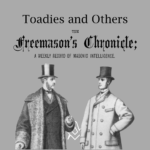 In the realm of Masonry, the principles of equality and respect are paramount. Yet, the presence of toadies—those who obsequiously seek favour from the influential—threatens these ideals. While Masonry embraces diverse beliefs and backgrounds, it rejects the sycophantic behaviours of toadies, flunkeys, and tuft-hunters, urging members to uphold genuine respect and self-worth. The Freemason's Chronicle - 22nd January 1876 |
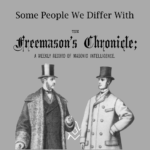 Unveiling the Unpleasant: Some People We Differ With Discover the intriguing dynamics of quarrels within the Masonic brotherhood. From the cantankerous to the litigious, the peevish to the vengeful, delve into the characters that challenge fraternal harmony. Explore their motives, temperaments, and the art of navigating disputes with these fascinating brethren. Brace yourself for a riveting journey into the world of conflicting personalities. |
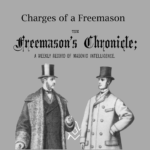 Unravelling the Masonic Mystique: A Deep Dive into the Freemasons' Charges - Explore the intricate world of Freemasonry, its principles, rituals, and the mechanisms for resolving internal disputes. Discover how this ancient fraternity fosters unity, promotes moral conduct, and upholds the sanctity of its secrets, while navigating the complexities of modern society. - The Freemason's Chronicle - 4 December 1875 |
 Unlock the hidden lessons of Masonic Studies! Don't settle for superficial knowledge or mere rituals. Discover the true depth and meaning behind Freemasonry. Expand your understanding of Tracing-Boards, Lectures, and more. Join regular Lodges of Instruction to enhance your Masonic journey. Become a knowledgeable Freemason, not just a token-bearer. Unleash the power of true Masonic wisdom today! |
 Uncover the incredible story of how Masonry saved the life of a Crimean War foot soldier in this historical and masonic account. Through the first hand experience of a soldier engaged in fierce hand-to-hand combat, witness the fateful encounter with a Russian Freemason that changed the course of his life. Learn how brotherhood and a deep dedication to the craft can lead to unforeseen and life-saving circumstances on the battlefield. |
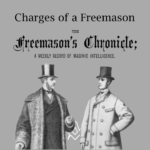 The Freemason's Chronicle - Charges of a Freemason The secrets of Masonry are the exclusive property of the Craft, and can never be communicated to one who is a mere labourer and not an accepted Mason. Hence, no labourer, that is, one who has not been regularly initiated in a legal Lodge. Article first published in The Freemason's Chronicle, 27 November 1875 |
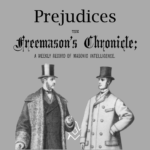 The Freemason's Chronicle - Prejudices Prejudices are partial judgments in favour of, or against certain persons or things, and, for convenience sake, may be ranged in two categories—those which are, comparatively speaking, harmless, and those which are harmful. Article first published in The Freemason's Chronicle, Oct. 2 1875. |
 The Freemason's Chronicle - Cliques Is Freemasonry - a Clique ? Man has been defined as a gregarious animal, but in his highly civilised condition he is gregarious only to a limited extent. First published in The Freemason's Chronicle, Oct. 2 1875, addresses the same challenges then as now. |
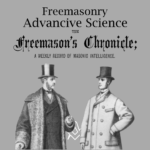 The Freemason's Chronicle - Freemasonry - an Advancive Science Is Freemasonry - an Advancive Science ? Not to confuse advancement with innovation. Has it been the case that Freemasonry's survival for 300 years plus is due to being an Advancive Science, tending to advance. First published in The Freemason's Chronicle 18 September 1875, addresses the same challenges then as now. |
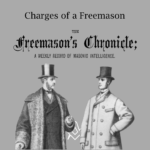 The Freemason's Chronicle - Charges Of A Freemason An interpretation of the "Charges of a Freemason", written Bro. Cornelius Moore and published in 1875, that introduce certain opinions that for some readers, will not sit well in contemporary times. - The Freemason's Chronicle, Sept. 11, 1875 |
 On The Order Of The Temple And Its Doctrine. THE Order of the Temple is divided into two great classes, denominated respectively the Order of the Temple and the Eastern Order. The Eastern Order gave birth to the Order of the Temple, and in the course of time has become an appendage of the latter. It is in ancient Egypt that we find the cradle of the Eastern Order. The Freemason's Chronicle, Sept. 4, 1875 |
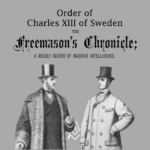 Order of Charles XIII of Sweden The following translation of the Manifesto of King JL Charles XIII of Sweden, on the occasion of his establishing the Masonic Order which bears his name, and of the Statutes of the said Order, may be interesting to our readers. The Freemason's Chronicle, Aug. 28, 1875 |
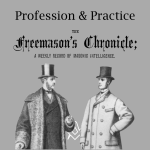 Most of our readers in the course of their experience, have doubtless met with enthusiastic brethren who take it for granted that a Mason can do no wrong. These enthusiasts are thoroughly convinced that the vast majority of those who join the Order are the most benevolent, the most moral, and the very noblest members of society. - The Freemason's Chronicle 10 July 1875 |
 An article investigating the relationship between masonry and citizenship. Are the principles of Freemasonry aligned with the freemason's claim to be a better citizen of the world? The Freemason's Chronicle - 19 June 1875 |
 A visitor must make clear his identity to the satisfaction of the Lodge he proposes to visit. More than once have we been asked to explain our views as to the reception of strangers in a Lodge. - The Freemason's Chronicle - 29 May 1875 |
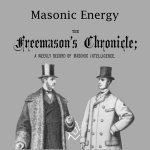 Is there reason in the accusation that Masonic energy looks only to a course of good feeds, when we can point to such grand results as have been achieved in these latter years, both in respect of the extension of our Order ? - 1May 1875 |
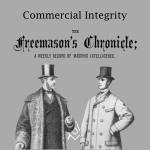 Implementing Freemasonry's peculiar system of morality in our day to day business affairs was the topic of this article, Commercial Integrity, first published in The Freemason's Chronicle - 8 May 1875 |
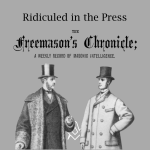 Ridicule has been somewhat illogically described as the test of truth. If it were so, Freemasonry ought to have perished long since. Two press reports from May 1875 covering the |
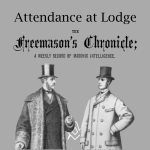 There are many things which Freemasonry will do for a man in the way of opening his mind and giving him larger and kindlier views of life, but Freemasonry itself, cannot eradicate the natural bias of the disposition. |
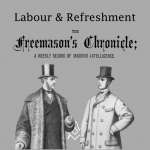 There is, we fear, too marked a tendency in very many Lodges to hasten through its labours, with a view to entering, as soon as possible, upon the business of refreshment. - The Freemason's Chronicle 17th April, 1875 |
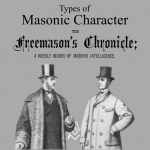 Another example that demonstrates that nothing really changes in Freemasonry. In an article the Types of Masonic Character published 145 years ago in The Freemason's Chronicle 10th April, 1875 |
 A brief history on the relationship between the British Monarchy and the craft - The Freemason's Chronicle 20th March , 1875 |
 What are the qualities of a convivial man and how does this dovetail perfectly in to Freemasonry ? 16th March, 1875 |
 A review of the "Sketch for the History of the Dionysian Artificers," a fragment, by Hyppoli to Joseph Da Costa - This little work may be regarded as, so to speak, the Holy Grail of Masonry. |
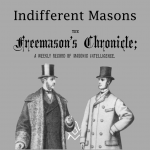 Nothing really changes, an article Indifferent Masons, From Le Monde Maçonnique 1874. Translation published in The Freemason's Chronicle 20th February, 1875 |
 In handling an intruder in the lodge, we endeavoured to show that a good Mason should be a gentleman, and a sincere man. The Freemason's Chronicle 20th February, 1875 |
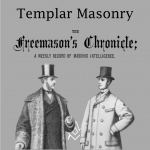 Templar Masonry - a historical aspect of the Religious and Military Order of the Temple published in The Freemason's Chronicle 13th February, 1875 |
 Secrecy perhaps the strongest objection urged by the enemies of the Masonic Order against its existence published in The Freemason's Chronicle 20th March 1875 |
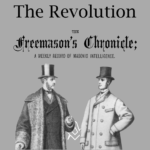 Freemasonry In The United States during And After The Revolution We take a look at Freemasonry in the United States during and after the Revolution first published in The Freemason's Chronicle - February 6, 1875 |
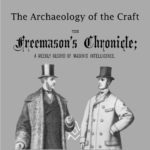 We take a look at the archaeological connection with the Craft, first published in The Freemason's Chronicle - January 30, 1875 |
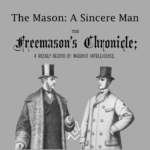 What it means to a Freemason to be a sincere man. Extract: first published in The Freemason's Chronicle - January 23, 1875 |
 What it means to a Freemason to be a citizen of the world ? First published in The Freemason's Chronicle - January 16, 1875 |
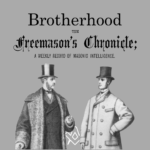 Brotherhood! In that one word what sympathetic associations arise. First published in The Freemason's Chronicle - January 9, 1875 |
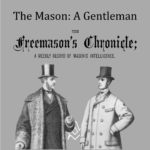 This opening article was written 145 years ago, yet it resonates with Freemasons today as it did then. First published in The Freemason's Chronicle, January 2, 1875, Issue 1 |
masonic knowledge
to be a better citizen of the world
share the square with two brothers

click image to open email app on mobile device






